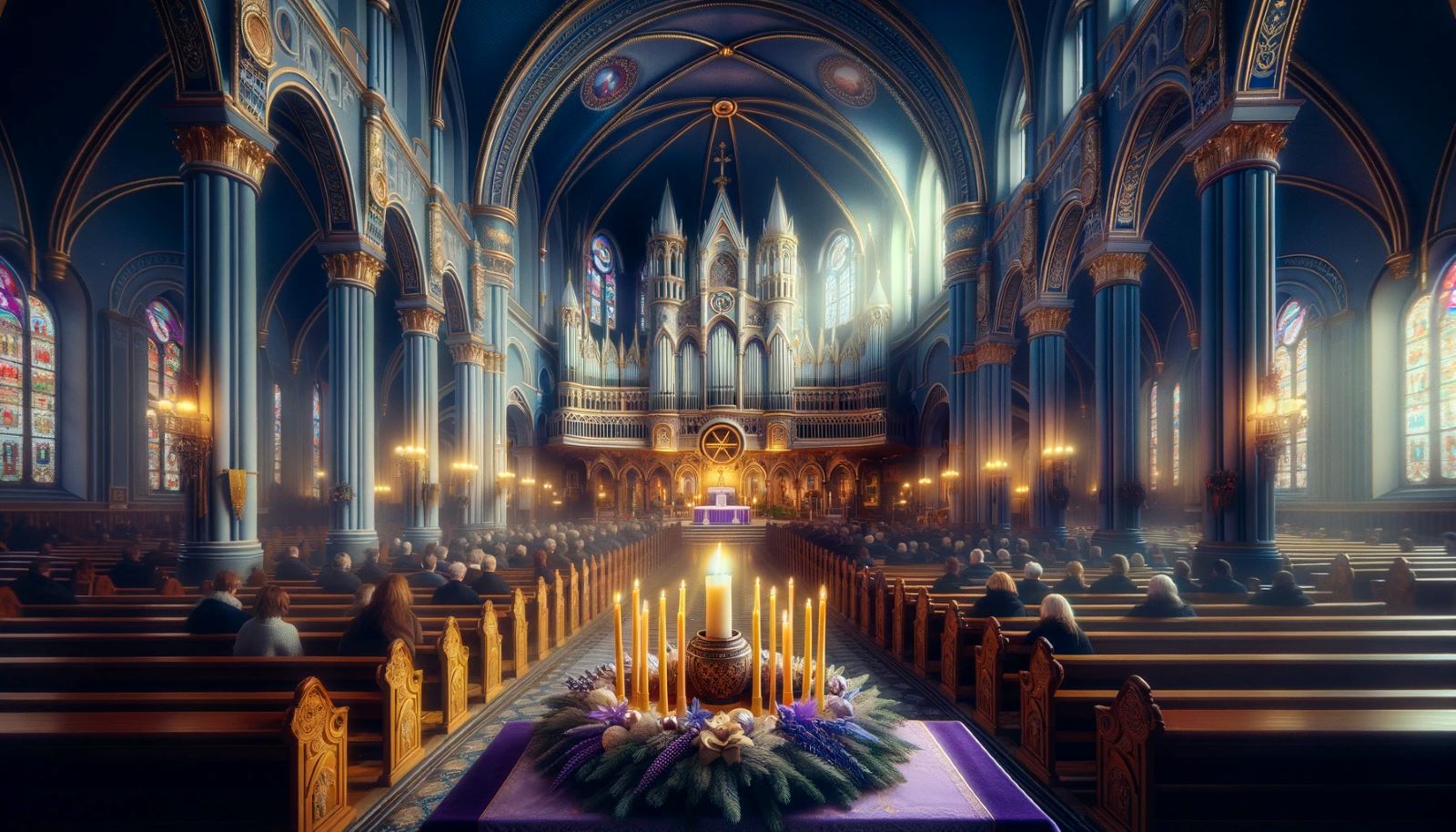Home>Special Themes>How Many Sundays Are In Advent


Special Themes
How Many Sundays Are In Advent
Published: February 13, 2024
Ericka Andersen, an editor at Christian.net, expertly merges digital strategy with content creation, focusing on faith and societal issues. Her communication skills enhance the platform's engaging narratives, fostering meaningful dialogue on belief's impact on society.
Discover the significance of special themes in Advent and learn how many Sundays are observed during this sacred season. Explore the traditions and meaning of Advent.
(Many of the links in this article redirect to a specific reviewed product. Your purchase of these products through affiliate links helps to generate commission for Christian.net, at no extra cost. Learn more)
Table of Contents
Introduction
Advent, a word derived from the Latin "adventus," meaning "coming" or "arrival," marks the beginning of the liturgical year in the Christian calendar. It is a time of anticipation, preparation, and hope as believers await the celebration of the birth of Jesus Christ. The season of Advent encompasses the four Sundays leading up to Christmas, serving as a period of reflection and spiritual readiness for the joyous arrival of the Christ child.
During this sacred time, individuals and communities engage in various traditions and rituals that symbolize the themes of hope, love, joy, and peace. These elements are embodied in the lighting of the Advent wreath, the singing of hymns, the reading of scripture, and the contemplation of the prophetic messages foretelling the coming of the Messiah.
As we delve into the significance and customs of Advent, we will explore the historical roots of this observance, the number of Sundays it encompasses, and the profound meaning behind each Sunday as it relates to the overarching narrative of the Christian faith. Join us on this enlightening journey through the heart of Advent, where we uncover the timeless traditions and profound spiritual significance that continue to inspire and uplift believers around the world.
Read more: How Many Candles On Advent Wreath
The Meaning of Advent
Advent, a season of profound significance in the Christian faith, embodies a sense of eager anticipation and spiritual preparation for the celebration of the birth of Jesus Christ. It symbolizes the period of waiting and longing for the arrival of the Messiah, both in the historical context of the Nativity and in the anticipation of Christ's eventual return. This sacred time, which begins on the fourth Sunday before Christmas, serves as a poignant reminder of the hope and promise brought by the arrival of Jesus into the world.
At its core, Advent represents a time of introspection and spiritual renewal, inviting believers to reflect on the profound themes of hope, love, joy, and peace. These themes are often symbolized by the lighting of the Advent wreath, with each candle representing a different aspect of the spiritual journey towards the birth of Christ. The progressive lighting of the candles throughout the four weeks of Advent serves as a visual representation of the increasing anticipation and illumination brought by the imminent arrival of the Savior.
Moreover, Advent is a season of preparation, both spiritually and practically. It encourages individuals to engage in acts of kindness, generosity, and compassion, mirroring the love and grace exemplified by the life and teachings of Jesus. This period of reflection and preparation extends beyond the hustle and bustle of the holiday season, prompting believers to cultivate a spirit of mindfulness and gratitude amidst the festivities.
The observance of Advent also encompasses the reading of prophetic scriptures and the retelling of the biblical narratives that foretold the coming of the Messiah. This serves as a poignant reminder of the historical context and the profound significance of the Nativity, grounding believers in the timeless story of God's redemptive plan for humanity.
In essence, the meaning of Advent transcends mere anticipation of a historical event; it encapsulates the enduring hope and promise that Christ's birth represents for believers across generations. It is a season of spiritual awakening, communal worship, and joyful anticipation, inviting individuals to embrace the transformative power of the Christmas message. As we delve deeper into the historical and spiritual dimensions of Advent, we gain a profound appreciation for the enduring significance of this sacred season in the Christian calendar.
The History of Advent
The history of Advent traces its origins to the early centuries of the Christian church, evolving over time to become a cherished and integral part of the liturgical calendar. The earliest recorded observance of Advent can be traced back to the 4th and 5th centuries in Gaul (modern-day France) and Spain, where it was initially observed as a period of fasting and preparation for the baptism of new Christians on Epiphany, the feast commemorating the manifestation of Christ to the Gentiles.
During this formative period, Advent was characterized by a solemn and penitential tone, akin to the season of Lent. It was a time of spiritual introspection and preparation, marked by fasting, prayer, and acts of charity. The duration of Advent varied, with some regions observing a fast of three weeks, while others extended the period to six weeks.
The early observance of Advent also emphasized the theme of Christ's second coming, known as the Parousia, in addition to the anticipation of the Nativity. This dual focus on the historical and eschatological aspects of Christ's coming underscored the profound significance of Advent as a time of both remembrance and expectation.
Over the centuries, the observance of Advent continued to evolve, with the introduction of liturgical elements such as the Advent wreath and the use of specific readings and prayers during worship services. The liturgical reforms of the Second Vatican Council in the 1960s further solidified the structure and themes of Advent, emphasizing the joyful anticipation of Christ's birth and the spiritual preparation for the celebration of Christmas.
Today, Advent stands as a cherished season in the Christian calendar, uniting believers across denominations in a shared journey of faith and anticipation. Its rich historical legacy, rooted in the early traditions of the church, continues to inspire reverence, contemplation, and spiritual renewal among the faithful.
As we delve into the historical tapestry of Advent, we gain a deeper appreciation for the enduring legacy of this sacred season, which has transcended centuries and cultural shifts to remain a beacon of hope and anticipation for believers around the world.
The Number of Sundays in Advent
Advent, the season of spiritual preparation and anticipation, spans four Sundays leading up to Christmas. This intentional structure serves as a symbolic and practical framework for believers to engage in a progressive journey of reflection and readiness for the celebration of Christ's birth.
The four Sundays of Advent are marked by the lighting of candles on the Advent wreath, with each candle representing a specific theme: hope, love, joy, and peace. As each week unfolds, an additional candle is lit, signifying the deepening sense of anticipation and illumination as the arrival of Christmas draws near.
The first Sunday of Advent heralds the beginning of the liturgical year in many Christian traditions, setting the tone for a period of spiritual renewal and joyful expectation. It serves as a poignant reminder of the historical context of Christ's coming and the prophetic anticipation that permeated the hearts of believers throughout the ages.
The second Sunday of Advent continues the journey of preparation, focusing on the theme of love. This theme echoes the profound message of God's unconditional love manifested in the gift of His Son, Jesus Christ. It invites believers to reflect on the transformative power of love and the enduring significance of Christ's birth as the ultimate expression of divine love for humanity.
The third Sunday of Advent, often referred to as Gaudete Sunday, exudes a sense of joy and rejoicing as the anticipation reaches its peak. The rose-colored candle on the Advent wreath symbolizes the joyous nature of the season, inviting believers to embrace the profound sense of hope and celebration that accompanies the imminent arrival of Christmas.
The fourth and final Sunday of Advent encapsulates the theme of peace, underscoring the tranquil and harmonious essence of Christ's coming. It serves as a moment of profound reflection on the peace that Christ brings to the hearts of believers and to the world, embodying the transformative impact of His birth on humanity's collective journey.
In essence, the four Sundays of Advent form a cohesive narrative of spiritual preparation, culminating in the joyous celebration of Christmas. Each Sunday carries a distinct theme that resonates deeply with the human experience, inviting believers to engage in a holistic journey of hope, love, joy, and peace as they await the arrival of the Christ child.
As we immerse ourselves in the significance of the four Sundays of Advent, we are reminded of the timeless themes that continue to inspire and uplift believers, fostering a sense of unity, anticipation, and spiritual renewal as the Christmas season unfolds.
The Significance of the Sundays in Advent
The four Sundays of Advent hold profound significance in the Christian faith, encapsulating a journey of spiritual preparation, anticipation, and profound reflection as believers await the celebration of the birth of Jesus Christ. Each Sunday carries a distinct theme that resonates deeply with the human experience, inviting individuals to engage in a holistic exploration of hope, love, joy, and peace as they immerse themselves in the timeless narrative of the Nativity.
The first Sunday of Advent symbolizes hope, serving as a poignant reminder of the anticipation and longing that permeated the hearts of believers throughout history as they awaited the arrival of the Messiah. It represents the dawn of a new liturgical year, igniting a sense of optimism and expectation as individuals embark on a transformative journey of spiritual renewal and readiness for the joyous celebration of Christmas.
The second Sunday of Advent focuses on the theme of love, echoing the profound message of God's unconditional love manifested in the gift of His Son, Jesus Christ. It invites believers to reflect on the transformative power of love and the enduring significance of Christ's birth as the ultimate expression of divine love for humanity. This theme resonates deeply with the universal human experience, fostering a sense of compassion, empathy, and interconnectedness as individuals prepare their hearts to receive the gift of love personified in the Christ child.
The third Sunday of Advent, often referred to as Gaudete Sunday, exudes a sense of joy and rejoicing as the anticipation reaches its peak. The rose-colored candle on the Advent wreath symbolizes the joyous nature of the season, inviting believers to embrace the profound sense of hope and celebration that accompanies the imminent arrival of Christmas. It serves as a vibrant reminder of the enduring joy that Christ's birth brings to the world, infusing hearts with a spirit of exuberance and gratitude.
The fourth and final Sunday of Advent encapsulates the theme of peace, underscoring the tranquil and harmonious essence of Christ's coming. It serves as a moment of profound reflection on the peace that Christ brings to the hearts of believers and to the world, embodying the transformative impact of His birth on humanity's collective journey. This theme resonates deeply with the universal longing for inner peace and global harmony, inviting individuals to cultivate a spirit of serenity and goodwill as they prepare to welcome the Prince of Peace into their midst.
In essence, the significance of the Sundays in Advent extends far beyond mere observance; it embodies a profound journey of spiritual awakening, communal worship, and joyful anticipation. Each Sunday serves as a poignant reminder of the enduring themes of hope, love, joy, and peace that continue to inspire and uplift believers, fostering a sense of unity, anticipation, and spiritual renewal as the Christmas season unfolds.
Read more: How Many Candles Are Lit For Advent
Conclusion
In conclusion, the season of Advent stands as a timeless testament to the enduring hope, love, joy, and peace that permeate the Christian faith. As believers embark on the journey of spiritual preparation and anticipation, the four Sundays of Advent serve as poignant milestones, each encapsulating a distinct theme that resonates deeply with the human experience.
The first Sunday of Advent ignites a sense of hope, symbolizing the anticipation and longing that have characterized the hearts of believers throughout history. It marks the beginning of a transformative journey, inviting individuals to embrace the promise of a new liturgical year and the imminent celebration of the birth of Jesus Christ.
The second Sunday of Advent centers on the theme of love, inviting believers to reflect on the profound message of God's unconditional love manifested in the gift of His Son. This theme fosters a spirit of compassion, empathy, and interconnectedness, reminding individuals of the transformative power of love as they prepare to receive the ultimate expression of divine love in the Christ child.
Gaudete Sunday, the third Sunday of Advent, exudes a sense of joy and celebration as the anticipation reaches its peak. It serves as a vibrant reminder of the enduring joy that Christ's birth brings to the world, infusing hearts with a spirit of exuberance and gratitude as believers eagerly await the arrival of Christmas.
The fourth and final Sunday of Advent encapsulates the theme of peace, inviting individuals to cultivate a spirit of serenity and goodwill as they prepare to welcome the Prince of Peace into their midst. It serves as a profound moment of reflection on the transformative impact of Christ's birth, both on a personal and collective level, as believers yearn for inner peace and global harmony.
As the four Sundays of Advent unfold, they weave a narrative of spiritual awakening, communal worship, and joyful anticipation, fostering a sense of unity and spiritual renewal among believers. The timeless traditions and profound significance of Advent continue to inspire reverence, contemplation, and a deepening of faith as individuals prepare to celebrate the birth of Jesus Christ.
In essence, the journey through Advent transcends mere observance; it embodies a profound invitation to embrace the enduring themes of hope, love, joy, and peace, infusing the hearts of believers with a renewed sense of purpose and anticipation. As the Christmas season draws near, the spirit of Advent serves as a guiding light, illuminating the path towards a deeper connection with the timeless message of the Nativity and the transformative power of Christ's birth.














